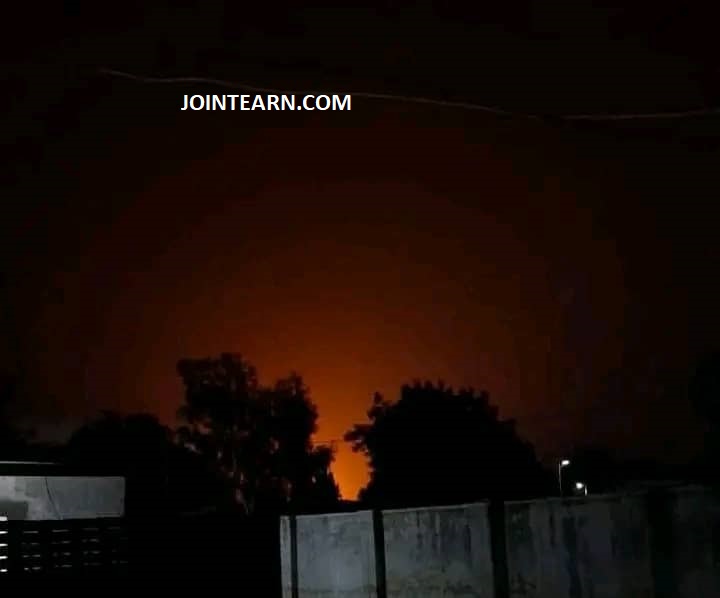The Nigerian Army has officially confirmed that the explosion that occurred at a military barracks in Maiduguri, Borno State, on Tuesday, April 30, 2025, was caused by extreme heat and not the result of any terrorist activity, as initially feared by residents and observers. The clarification was made in a press statement issued by the Director of Army Public Relations, Major General Onyema Nwachukwu, who assured the public that the situation was under control and there was no cause for panic.
The explosion, which occurred in the early hours of the day within the Maimalari Cantonment — the headquarters of the 7 Division of the Nigerian Army — sparked widespread concern among locals due to the state’s history of insurgent attacks. Loud booms and thick plumes of smoke were reported in the area, causing residents to flee their homes in fear of a possible Boko Haram or ISWAP attack.
However, the Army moved swiftly to douse the tension and set the record straight, stating that the blast was caused by the spontaneous combustion of ordnance materials stored in an outdoor shed, made worse by the searing heatwave currently sweeping across northern Nigeria.
Details of the Incident
According to the Army’s statement, the explosion occurred in a temporary ammunition storage facility located away from residential quarters within the barracks. The structure housed old and expired explosives awaiting proper disposal by specialized personnel. With temperatures in Maiduguri reaching nearly 45 degrees Celsius in recent days, the intense heat reportedly triggered a chain reaction that resulted in the blast.
“There is no act of sabotage or terrorist attack involved in this incident,” Major General Nwachukwu said. “The explosion was purely an accident caused by environmental factors, primarily excessive heat, which ignited some unstable explosive materials.”
He added that a technical investigation was immediately launched following the incident and that preliminary findings confirmed the absence of any external interference.
Casualties and Damage Assessment
While the Army did not report any fatalities, a few personnel and civilians within the vicinity sustained minor injuries, mostly from shockwaves and flying debris. The affected individuals were promptly treated at the medical facility within the barracks and have since been discharged.
In terms of property damage, a few nearby buildings sustained structural damage such as broken windows and cracked walls. Fortunately, the bulk of the blast was contained within the ammunition shed, preventing a larger catastrophe.
Firefighters and emergency response teams were quickly deployed to the scene to contain the fire and prevent further damage. By midday, the situation had been brought under control, with normalcy gradually returning to the cantonment and surrounding communities.
Public Reaction and Army Assurance
The explosion initially caused panic among residents of Maiduguri, many of whom feared a resurgence of coordinated attacks by terrorist groups known to operate in the region. Several unverified videos circulated online shortly after the incident, claiming that the city was under attack. These videos further escalated anxiety, prompting the Army to issue its statement and urge the public to disregard misleading information.
“We call on members of the public to remain calm and refrain from spreading unverified reports that can cause unnecessary panic,” Major General Nwachukwu stated. “The Nigerian Army remains committed to the safety and security of all citizens and is fully alert to any threats.”
Borno State Governor Babagana Zulum also responded to the incident by visiting the scene and expressing relief that no lives were lost. He commended the quick response of the military and emergency services, while also calling for more stringent safety measures regarding the storage of explosive materials in sensitive locations.
“This incident, though unfortunate, should serve as a lesson on the importance of proper storage and disposal of ordnance materials, especially in our climate where extreme heat is becoming more frequent,” Governor Zulum said.
Expert Insights and Safety Recommendations
Following the explosion, military analysts and safety experts weighed in on the dangers of improper storage of munitions in hot climates. According to retired Army Colonel Ibrahim Musa, the incident underscores a broader challenge facing the military in terms of infrastructure and adherence to safety protocols.
“Many of these temporary storage facilities are not built to withstand high temperatures,” he noted. “There is an urgent need to modernize our ammunition storage systems and ensure that obsolete materials are swiftly and safely disposed of.”
Colonel Musa recommended the use of underground bunkers, climate-controlled storage units, and more frequent inspections to prevent future incidents.
Looking Ahead
In response to the incident, the Army has set up a board of inquiry to conduct a comprehensive investigation into the circumstances that led to the explosion. The outcome of the investigation is expected to inform future protocols and safety standards across all military installations in the country.
The Nigerian Army also reiterated its commitment to transparency and professionalism, emphasizing that the welfare of personnel and the safety of civilians remain top priorities.
As Maiduguri and its residents return to normalcy, the incident serves as a stark reminder of the unpredictable nature of explosives and the urgent need for improved storage infrastructure, especially in regions grappling with extreme weather conditions.
Despite the unfortunate nature of the event, the swift response and open communication from the military have been widely praised as a step in the right direction, reflecting a renewed commitment to accountability and public reassurance.












